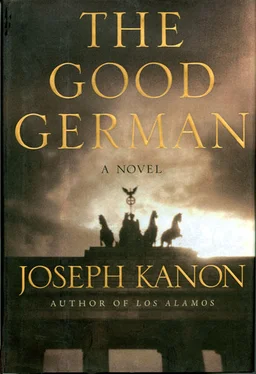He was in the kitchen, washing up, when she came out, toweling her hair. She looked brighter, as if the dark circles under her eyes had been merely dirt.
“I’ll do that,” she said.
No, you get into bed. I’m going to spoil you for a few days.“
Your typewriter,“ she said, moving to the table and touching the keys.
“Not the same one, though. That’s still in Africa somewhere. I had a hell of a time getting this one.”
She touched the keys again. He saw that her shoulders were shaking, and he went over to her, turning her around.
“So silly,” she said, crying, “a typewriter.” Then she fell against his shoulder, holding him, so that his face was in her hair, a fresh smell now, and he burrowed into it.
“Lena,” he said, feeling her shudder, still crying, the way it should have been at the train station, some involuntary release.
Her head nodded against him and they stood that way for a minute, just holding each other, until he felt the heat through her hair and pulled away, brushing tears from the corners of her eyes with his fingers.
“Maybe some rest, huh?”
She nodded again. “It’s the fever, this,” she said, wiping her eyes, collecting herself. “So silly.”
“That’s what it is,” he said.
“Just hold me,” she said, “like you used to.”
And for a moment he didn’t want to do anything else, so happy the room around him seemed to melt away. But her hair was damp with sweat again and he could feel her sag against him.
“Come on, we’ll put you to bed,” he said, his arm around her as he walked her down the hall. “Clean sheets,” he said, pleased with himself, but she didn’t seem to notice. She slipped into bed and closed her eyes.
“I’ll let you sleep.”
“No, talk to me. It’s like medicine. Tell me about Africa. Not the war. What it was like.”
“Egypt?”
“Yes, Egypt.”
He sat on the bed, brushing back her hair. “On the river it’s beautiful. You know, sailboats.”
She frowned, as if trying to see it. “Boats? In the desert?”
“And temples. Huge. I’ll take you someday,” he said, and when she didn’t respond, he went on, describing Cairo and the old souk, the pyramids of spices, until he saw that she had finally drifted on, another sailboat.
He finished washing up, then out of habit sat down at the typewriter. Lena was right; he should work, they’d expect something in a day or two, and here was the old table, where he used to type out the broadcasts, looking into the busy square. The street was almost deserted now, just the usual thin stream of army trucks and refugees, but the spell had caught him, all the familiar props. When he started typing the clicking sound filled the room like an old phonograph record, found at the bottom of the pile.
“Potsdam Up Close,” something he could make up from hearsay and pictures, but with a chance to put himself on the spot, face-to-face with the Big Three, almost as if he’d been at the baize table too, talking to them, the only journalist there, something Collier’s would like. Maybe even a cover line. Dressed up with eyewitness details-the red star of geraniums, the chimneys, the patrolling Russians. Then the contrast to central Berlin, his trip that first day, Churchill at the Chancellery, putting himself in Brian Stanley’s place, who wouldn’t mind and who probably wouldn’t see it anyway. Our man in Berlin. Not what had really happened-a squalid murder, getting his life back-but what mattered to Collier’s, enough to keep the contract going. The football game as a finish, building the peace even while the Big Three negotiated. When he finished, it was a thousand words too long, but Collier’s could worry about that. He was back in business. Let them cut Quent Reynolds.
Rosen came before dinner, not furtive this time, even apologetic.
“Mr. Alford explained the situation. Forgive me if I—”
“Never mind. You’re here, that’s what matters. She’s been sleeping.”
“Yes, good. You didn’t say anything-what I told you? Sometimes its a little sensitive, even after everything. Their sweethearts come back, they think everyone waits. It’s difficult.”
“I don’t care.”
“No? It’s not always the case.”
Another Berlin story that didn’t make the piece, arguments and tears. He thought of the soldiers crossing the Landwehrkanal that day, almost home.
This time Rosen had brought a thermometer.
“A little better,” he said at the bed, reading it. “The penicillin must be working. A miracle drug. From mold. Imagine.”
“How much longer?”
“Until she’s better,” he said vaguely. “You can’t kill the infection with one shot. Not even a miracle drug. Now you, gnadige frau, drink sleep, that’s all-no shopping.” A friendly bedside phrase, as if there were shops. “Think good thoughts. Sometimes that’s the best.”
“He’s taking care of me,” Lena said. “He changed the sheets.” Noticing after all.
“So,” Rosen said, amazed, still a German man.
Outside, Jake gave him money. “Do you need any food?” he said pointing to the cans on the counter. “PX.”
“Perhaps some tinned meat, if you can spare.”
Jake handed him a can.
“I remember,” Rosen said, looking down at it. “When we got out, the Americans gave us these. We couldn’t eat-too rich. It wouldn’t stay down. We threw up everything, right in front of them. They were offended, I think. Well, how could they know? Excuse me for last night. Sometimes it’s not only the body that vomits. The spirit goes too.”
“You don’t have to explain. I saw Buchenwald.”
Rosen nodded and turned to the door. “Keep up with the tablets, don’t forget.”
Lena insisted on getting up for dinner, so the three of them sat around the table, Hannelore bubbling over with high spirits, as if the ham sandwich had been another kind of injection.
“Wait till you see what I got at Zoo Station, Lena. For ten cigarettes. She wanted the pack, and I said, who gets a pack for a dress? Even ten was too many, you know, but I couldn’t resist. In good condition, too. I’ll show you.”
She got up and held the dress to her body.
“See how well cut? She must have known somebody, I think. You know. And see how it fits. Not too small here.”
She took off her dress without a hint of embarrassment, and slid the new one over her slip.
“See? Maybe a tuck here, but otherwise perfect, don’t you think?
“Perfect,” Lena said, eating soup. A little more color than before.
“I couldn’t believe the luck. I can wear it tonight.”
“You’re going out?” Jake said. An unexpected bonus to the shopping trip, the flat to themselves.
“Of course I’m going out. Why not? You know, they opened a new cinema in Alexanderplatz.”
“The Russians,” Lena said grimly.
“Well, but some are nice. They have money, too. Who else is there?”
“No one, I guess,” Lena said indifferently.
“That’s right. Of course the Americans are nicer, but none of them speak German, except for the Jews. Are you not going to finish that?”
Jake handed her his piece of bread.
“White bread,” she said, a child with a sweet. “Well, I’d better get ready. You know, they’re on Moscow time, everything so early. Isn’t that crazy, when they have all those watches? Leave the dishes, I’ll do them later.”
“That’s all right,” Jake said, knowing she wouldn’t.
In a minute he heard a trickle of water in the bathroom, then a spray of perfume. Lena sat back, finished, looking out the window.
“I’ll get coffee,” Jake said. “I have a treat for you.”
She smiled at him, then looked again out the window. “There’s no one in Wittenbergplatz. It used to be so busy.”
Читать дальше












